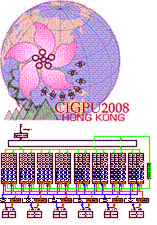 CIGPU 2008
CIGPU 2008
| W. B. Langdon | A Fast High Quality Pseudo Random Number Generator for Graphics Processing Units | doi | slides | pic |
| Garnett Wilson | Linear Genetic Programming GPGPU on Microsoft's Xbox 360 | doi | slides | pic |
| Wai-Man Pang | Generating Massive High-quality Random Numbers Using GPU | doi | slides | pic |
| Raghavendra D. Prabhu | SOMGPU: An unsupervised pattern classifier on Graphical Processing Unit | doi | slides | pic |
| Discussion: Practical Aspects of Running Evolution on GPU | ||||
|---|---|---|---|---|
| Simon Harding | ||||
| Tien-Tsin Wong | Shader Programming vs CUDA | slides | ||
| Audience | ||||
|
Suggested topics:
| ||||
| Simon Harding | Evolution of Image Filters on Graphics Processor Units Using Cartesian Genetic Programming | doi | slides | pic |
| Robert Luke | Speedup of Fuzzy Logic through Stream Processing on Graphics Processing Units | doi | pic | |
| W. B. Langdon | Evolving Genechip Correlation Predictors on Parallel Graphics Hardware | doi | slides | pic |
| Shinji Fukui | GPU Based Extraction of Moving Objects without Shadows under Intensity Changes | doi | ||
| Discussion: Future of CIGPU | ||||
| W. B. Langdon | ||||
| Simon Harding | ||||
| Audience | ||||
| ||||
| Social Event | ||||
| Man Leung Wong | Buffet | |||
(Photographs by Simon Harding)
CIGPU 2008 and other papers
Submissions were invited in the following areas
W. B. Langdon,
wlangdon@
Departments of Biological and Mathematical Sciences, University of Essex
essex.ac.uk
Simon Harding,
simon.harding@
Computer Science Department
Memorial University of Newfoundland
cs.mun.ca
Man Leung Wong,
mlwong@
Department of Computing & Decision Sciences,
Lingnan University, Hong Kong
ln.edu.hk
Authors of papers on research or applications in any area of computational intelligence (be it neural networks, fuzzy system, evolutionary, genetic, etc.) running on graphics hardware or other mass market electronic hardware have been invited to submit their work to CIGPU-2008. CIGPU will be held as part of the IEEE world congress on computational intelligence in Hong Kong 1-6 June 2008.
Due to
its speed, price and availability,
there is increasing interest in using mass consumer market
commodity hardware
for engineering and scientific applications.
To date most of this interest has concentrated upon
graphics hardware, particularly GPUs.
However there is increasing interest in using games consoles
such as Microsoft's Xbox, Playstation and the Cell processor,
for research and applications.
Indeed nVidia have recently announced Tesla
as a scientificated version of their newest GPUs.
In future personal computer physics engines,
which are intended to provide realistic
real time simulation of multi-body physics for sophisticated games,
may also be adapted to serve science (rather than simulated it).
Papers submitted for special sessions will be peer-reviewed with the same
criteria used for the contributed papers.
It is clear that, whilst there is increasing interest, at present computational intelligence is under represented. As with other GPGPU applications, the drivers are: locality, convenience, cost and concentration of computer power. Indeed the principle manufactures (nVidia and ATI) claim faster than Moore's Law increase in performance. Suggesting that GPU floating point performance will continue to double every twelve months, rather than the 18-24 months observed for electronic circuits in general [Moo65] and personal computer CPUs in particular. Indeed the apparent failure of PC CPUs to keep up with Moore's law in the last few years makes GPU computing even more attractive. Even today's top of the range GPU greatly exceed the floating point performance of their hosts' CPU. This speed comes at a price.
Dr. W.B. Langdon, Dr. Man Leung Wong and Dr. Simon Harding are internationally recognised experts at this.
The use of commodity graphics hardware for scientific computing (often referred to as General Purpose computing on Graphics Processing Units, GPGPU) is rapidly becoming established. Yet Computational Intelligence of all types has been slow to adopt GPGPUs. Drs. Wong, Harding and Langdon are at the forefront of use of GPUs in evolutionary computing. The special session will encourage take up of this technology in Fuzzy, Connectionist and other computational intelligence arenas.
At present there are relatively few (general purpose) GP GPU publications especially in computational intelligence, soft computing or genetic algorithms. However, previous experience with GPU areas, shows once started they take off very rapidly. The CI GPU area is about to explode and WCCI will be a very good launch site. Drs. Wong and Harding are very much the founders of the application of modern graphics hardware to evolutionary computing.